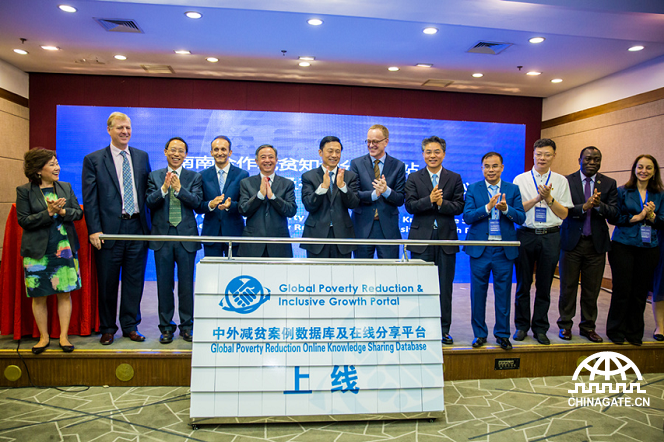1st poverty reduction database in tree diagrams launched
China.org.cn/ chinagate.cn,May 26, 2017 Adjust font size:
The Global Poverty Reduction Online Knowledge Sharing Database (http://case.iprcc.org.cn/) was launched at the 2017 China Poverty Reduction International Forum on May 26th in Beijing. Officials and representatives from international organizations, embassies as well as businesses have attended its launching ceremony.

Guo Weimin, Vice Minister of State Council Information Office (Left 6th), Chen Zhigang, Deputy Director of the State Council Leading Group Office of Poverty Alleviation and Development (Left 5th), Bert Hofman, World Bank Country Director of China, Mongolia and Korea (Left 7th), Vincent Martin, FAO Representative in China and DPR Korea (Left 4th), Benedict Bingham, Country Director, PRC Resident Mission, ADB (Left 2nd) and Hoonae Kim, Director, Asia and the Pacific Division, Program Management Department, International Fund for Agricultural Development (IFAD) (Left 1st) launched the Global Poverty Reduction Online Knowledge Sharing Database.
AN INNOVATIVE TOOL
Initiated by the Global Poverty Reduction & Inclusive Growth Portal (GPIG), the database is a platform to share successful models on poverty reduction from both China and the international community, distinguishing itself with tree diagrams, standardized templates and a strong network of contributors.
Designed for worldwide users, its systematic presentation of poverty alleviation cases is unprecedented. Applying tree diagrams, it provides a clear depiction of how China and other international bodies address the problem, focusing in particular on cases which are highly replicable in a technical sense. To facilitate social participation, the platform contains a guide to help users upload cases in standard templates.
The Chinese poverty reduction cases are divided into three categories: market-oriented, government-led, and community-driven. The international cases are classified as poverty reduction through increasing opportunities, through improving human capital and capacity, and through reducing vulnerability. Each has a set of subcategories.
By analyzing factors that have an impact on poverty reduction, the diagrams extract experience in a more intuitive way, inspiring the international community, the low-income nations in particular, to rapidly grasp specific successful practices, so as to learn from or even replicate the experience. It is hoped that the process will generate new solutions to poverty alleviation problems.
The database benefits from a strong network of contributors. While the International Poverty Reduction Center in China (IPRCC) takes a lead on the Chinese side by leveraging its own resources and partnering with universities and research institutes, a raft of international organizations also play their part. With main contributions from the World Bank, GPIG builds partnerships with the Asian Development Bank (ADB) and the Food and Agriculture Organization of the United Nations (FAO) as well. The public are also encouraged to upload cases that could be valuable.
A KEY STEP FORWARD
The guests spoke highly of the database at the forum.
Guo Weimin, Vice Minister of State Council Information Office, marked that the Global Poverty Reduction Online Knowledge Sharing Database took an innovative approach to promote south-south cooperation through ICTs, summarizing the best practices worldwide to help the developing countries to find their way out of poverty.
Vincent Martin, FAO Representative in China and DPR Korea, said: “to realize a world where no one left behind, invaluable poverty reduction policies and know-how generated in China and elsewhere should be made available to the international community to help achieve SDG1 and SDG2. In that regard, the launch of the Global Poverty Reduction Online Knowledge Sharing Database is a key step forward and innovation should be embedded in the sharing of policies and best practices. ”
A KNOWLEDGE-SHARING CENTER
As a systematic project, it is planned to summarize new poverty alleviation strategies, develop new representative cases, and add them to the database on a regular basis in the future. It is expected that, after years of efforts, the database will evolve into a knowledge-sharing center in the fields of poverty reduction and south-south cooperation.
China has recorded tremendous achievements in poverty alleviation by lifting more than 700 million people out of poverty. However, there lacks comprehensive or systematic publicity of China’s experience in the existing researches. Meanwhile, in the process of building a well-off society in an all-round way, China has been constantly exposed to new challenges. So it is necessary to build such an exchange platform, bringing in China the successful models from international community while introducing ours to the world.
The Global Poverty Reduction Online Knowledge Sharing Database has turned GPIG from an information sharer into a producer, which was officially launched at the forum last year. Initiated by the World Bank and supported by ADB, it is co-hosted and co-managed by IPRCC and China Internet Information Center (CIIC). With one year of development, the portal brings together information from different sources in a standardized way, promoting knowledge sharing online and offline. It contributes to the successful achievement of the Sustainable Development Goals (SDGs) as well, gaining positive response from the poverty reduction community.